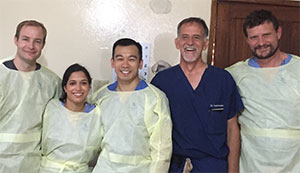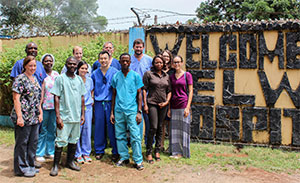After taking the lives of more than 11,000 people, the recent West African Ebola epidemic also left the largest recorded number of survivors in its wake. Those survivors now face Ebola’s aftershock — a post-disease syndrome that threatens to rob victims of both their vision and hearing. Two young ophthalmologists from Emory University recently joined the physician response to that syndrome.
Ebola at Home

From left to right: Drs. Hayek, Shantha, Yeh, Fankhauser and Crozier.
When Ian Crozier, MD, became infected with the Ebola virus last fall while volunteering in Sierra Leone, he was brought to Emory University Hospital. After a battle that almost took his life, he was finally cured. Or so he thought. A few months later he developed intense ocular pain and significant vision loss in his left eye.
Third-year Emory ophthalmology resident Jessica Shantha, MD, was a member of the team that spent a better part of two months managing what they discovered to be Dr. Crozier’s post-Ebola uveitis. Led by uveitis specialist Steven Yeh, MD, the Emory physicians tried several treatment options — from steroids to an experimental antiviral drug.
Thanks to his own resilience and the efforts of his medical team, Dr. Crozier’s sight gradually returned within a few months. But the experience left an indelible mark on both patient and physicians alike. Was this an isolated incident, or were other Ebola patients experiencing similar issues? What could this experience in the United States teach others on the ground in West Africa about the natural history of the disease?
To gain more insight, Drs. Yeh and Shantha reached out to NGOs and health care providers in Liberia, Sierra Leone and Guinea to see if they too were witnessing this sort of complication with uveitis.
“We felt responsible,” said Dr. Shantha. “After surviving the Ebola virus and losing family members and friends, West Africans were now developing eye complications that might be overlooked. And because uveitis is potentially treatable, we were motivated to reach out and ask what was going on.”
Ebola on the Ground

ELWA staff and the Emory QEWA team.
John Fankhauser, MD, a medical director at Eternal Love Winning Africa (ELWA) Hospital in Monrovia, Liberia, heard the call. At his Ebola trauma unit, more than 100 survivors continue to experience the chronic pain, headaches and eye trouble that characterize post-Ebola syndrome. But because of the limited number of ophthalmologists in the country and the lack of equipment necessary to diagnose and treat these patients, Dr. Fankhauser was at a loss — until the Emory team offered help.
With funding from the missionary group SIM (Serving in Mission) and ELWA Hospital, Drs. Yeh, Shantha and Crozier, along with Emory oculoplastic surgeon Brent Hayek, MD, traveled across the Atlantic in early April with medication and supplies. Their effort was titled Quiet Eye West Africa (QEWA), in reference to the “quiet” nature of an eye after recovery from active, symptomatic uveitis. For seven days, the team examined Ebola survivors, working alongside West African and international health care personnel led by Dr. Fankhauser to reach a better understanding of the natural history of the Ebola virus and share what they had learned from Dr. Crozier’s own treatment.
It was an experience they would never forget. Drs. Yeh and Shantha were present last year when two Americans — Kent Brantly, MD, and Nancy Writebol — were transferred to Emory University Hospital after contracting the Ebola virus during a humanitarian mission in West Africa. But now on the ground in Liberia, they saw the aftermath of the Ebola outbreak firsthand.
“A significant portion of the population was in desperate need of help in terms of treatment and isolation,” said Dr. Shantha, “and a small number of West African and international caregivers scrambled to provide the necessary care while allaying public fears.”
Liberia had buried its last known Ebola patient only days before the doctors’ April visit. For nearly a year, the country had been essentially shut down. “Care for HIV patients, vaccinations for children,” said Dr. Shantha, “all of these things ceased to exist, and so it wasn’t possible for the country to simply pick up where they left off. They’ve had to restart, reboot and rebuild.”
The Emory doctors could only do so much in a week, but with the assistance of the entire ELWA Hospital staff, Dr. Fankhauser and crew catered to their every need, setting up the ophthalmology clinics, helping with patient flow, finding translators and organizing survivors for visits.
Dr. Yeh credited Dr. Fankhauser’s advocacy for his flock. “He had suffering patients with ocular complaints that were out of his realm of experience and didn’t have anybody to immediately reach out to,” he said. “But he didn’t give up. He really is a hero there in Monrovia.”
What’s Next?
Now back home, Drs. Yeh and Shantha said they don’t have any immediate plans for a return trip, but they’re eager to reengage with West Africa’s survivors, especially in Guinea and Sierra Leone, where new cases continue to surface.
Dr. Shantha will graduate from Emory in less than two months. She said she hopes that, as a young ophthalmologist, she can build on this experience and continue her work as a physician and a humanitarian. Just a month prior to her West Africa trip, Dr. Shantha joined Dr. Hayek in Ethiopia as part of the Global Health Scholars Program, where she helped in an oculoplastics clinic at a county hospital.
“Early on in residency, I would never have expected to have these opportunities,” Dr. Shantha said, “but my advice for young physicians interested in global ophthalmology and relief efforts is to take advantage of any opportunity to travel, even if it’s just for a short time.”
For Dr. Yeh, the Liberia trip followed several humanitarian trips to Central America. He said that, now more than ever, physicians can take what they’ve learned at home and help other people throughout the world.
“We might go through our days and walk through our routines,” Dr. Yeh said. “But when you have a moment like ours in Liberia — the type that is rare — it’s important to learn as much as possible, because it can be translated into helping countless numbers of patients, and that has affected all of us deeply.”
* * *
About the author: Mike Mott is a former assistant editor for EyeNet Magazine and contributing writer for YO Info.